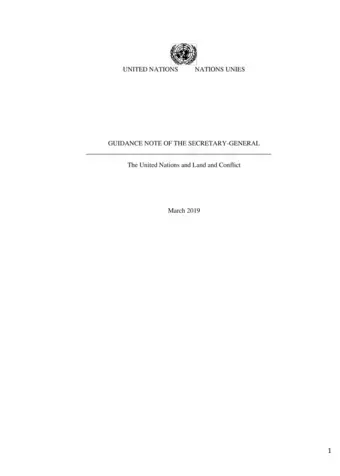The United Nations World Water Development Report, Leaving no one behind, launched 19 March 2019 during the 40th session of the United Nations Human Rights Council (UNHRC), and in conjunction to the World Water Day, demonstrates how improvements in water resources management and access to water supply and sanitation services are essential to addressing various social and economic inequities, such that ‘no one is left behind’ when it comes to enjoying the multiple benefits and opportunities that water provides.

This Note has been developed to help the UN system be more fit for purpose on land and conflict issues and is based on relevant international norms and standards, the 2030 Agenda for Sustainable Development, and the experiences of the UN system. The principles and framework for UN engagement are designed to achieve a sustained and strategic common approach across the peace and security, human rights and development pillars, and tailored to inform UN system programming and advocacy interventions.
As an extension of the Buraidah City Profile, the demonstration project will apply the United Nations Human Settlements Programme (UN-Habitat) principles on sustainable neighbourhood planning, applicable to the Saudi context. One of the primary goals of the project is to demonstrate how to implement possible solutions for shifting urbanisation in Saudi to a sustainable development track, without adopting heterotopic models. Instead, it intends to develop locally rooted traditions and culture and the design components.
The paper elaborates on the conceptual and practical framework of the principles of planned urbanization, characteristic of the integrated approach adopted by UN-Habitat to address the challenges of rapid urbanization in the developing world, namely (1) Rules and Regulations, (2) Urban Design, and the (3) Financial plan.
Due to a more stable phase in the prolonged conflict of the Eastern Democratic Republic of Congo, UN-Habitat recommends the initiation of permanent reconstruction and moving away from an emergency shelter in the area. The reconstruction process is recommended to reflect the local political, socio-cultural and physical context of the area and build on sustainable use of local building materials. In addition, generation of employment and local economic development through participatory processes and capacity building of community members is a key objective
This report describes the wider context, objectives, methodology, and findings of a two-year research project entitled MaS-SHIP. Funded by the United Nations Environment’s Sustainable Buildings and Construction programme of the 10 Year Framework Programme. MaS-SHIP has produced a comprehensive data framework, tools, evidence-based knowledge, insights and policy recommendations for mainstreaming sustainable social housing in India.
A socio-technical approach was adopted in the research, bringing together primary and secondary data collection with both quantitative and qualitative assessments, using literature review, stakeholder engagement, online and field surveys, statistical tests, and thermal simulations. The construction and policy ecosystem were examined to identify barriers and opportunities in adopting sustainable building materials and related design and construction practices, so as to develop policy recommendations.
While more often than not, ‘housing’ is defined as a basic need which provides family access to shelter and basic amenities, also enabling the creation of demand for resources, physical infrastructure, labour, technology, finance, and land. Housing is a physical manifestation of social and cultural practices and forms an integral part of the assessment of the development and health of an economy.
Thus housing refers not only to the physical structure of a house but its forward and backward linkages to job creation, resource requirements, institutional and regulatory systems, supporting infrastructure, services, and social cohesion.
The profile offers a comprehensive in-depth analysis of the country’s urban housing sector. The Profile contributes to the creation of a policy framework that enables the provision of adequate housing for all. It builds a comprehensive understanding of the functioning of the urban housing sector that can serve as an authoritative reference point for all actors involved in the direct provision or enablement of housing
The profile offers a comprehensive in-depth analysis of the country’s urban housing sector. The Profile contributes to the creation of a policy framework that enables the provision of adequate housing for all. It builds a comprehensive understanding of the functioning of the urban housing sector that can serve as an authoritative reference point for all actors involved in the direct provision or enablement of housing
The profile offers a comprehensive in-depth analysis of the country’s urban housing sector. The Profile contributes to the creation of a policy framework that enables the provision of adequate housing for all. It builds a comprehensive understanding of the functioning of the urban housing sector that can serve as an authoritative reference point for all actors involved in the direct provision or enablement of housing.